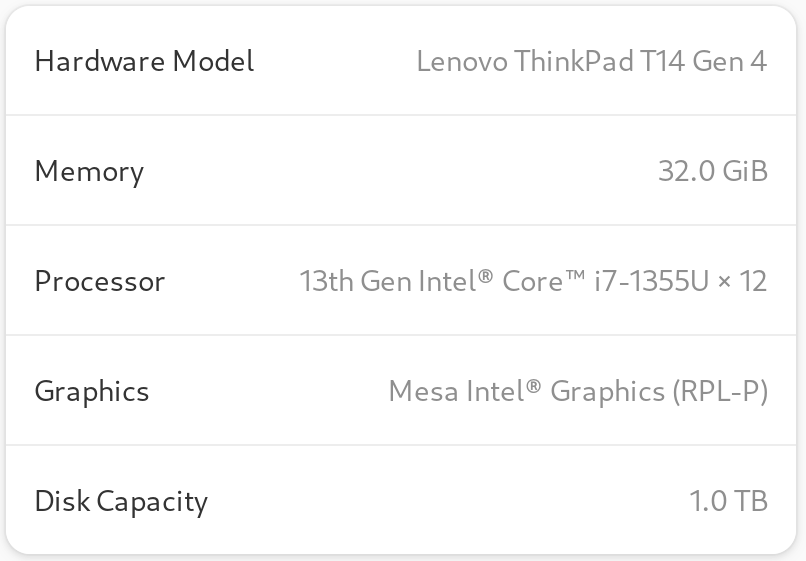Introduction
My tech setup aims at creating the right balance between privacy, security, long-term accessibility, and convenience.
TL;DR I use Linux on my laptop and run a home server which hosts many open-source services.
1. Hardware
I use a Lenovo T14 Gen 4 with a 2880x1800 (16:10) display.

Also, I run a Raspberry Pi as my home server.
I use the YubiKey for two-factor authentication and a travel router with a virtual private network (VPN) when I’m travelling.
2. Operating system
I use Debian 12 as the operating system on my Lenovo ThinkPad. Debian is a Linux distribution. There are many different distributions available but Debian is a good fit for me, mainly given its stability and maturity (e.g., availability of documentation).
I have been a Mac OS user for 20 years but decided to fully transition to Linux in January 2024. Over 10 years ago, I experienced Linux for the first time with Raspberry OS (fka Raspian). In November 2022, I started evaluating whether I want to fully move to Linux. Eventually, in January 2024, I sold my MacBook Air M1 and iPad Pro and ventured fully into the Linux ecosystem.
Why Linux?
- Curiosity about getting more into the machine room of an operating system (i.e., having the freedom & understanding to configure even more things)
- Strong respect for the outstanding work the open-source community is doing and the urge to experience it from within (and support where I can)
- Interest to have more control about the privacy of the operating system
3. Software
I use apt (default for Debian) and also flatpak as package managers. For flatpak, I use the flathub repository.
The following commands install most of my essential applications and tools.
sudo apt install chromium thunderbird vlc wireguard audacity calibre baobab filezilla fuse nmap gimp libreoffice openvpn opensnitch yt-dlp gnome-shell-extension-appindicator borgbackup curl r-base-core evolution-ews plank rclone python3-pip python3-full ssh cmake rsync heif-gdk-pixbuf sshfs syncthing npm php php-dom php-mbstring fprintd libpam-fprintd
sudo apt install flatpak gnome-software-plugin-flatpak
sudo flatpak remote-add --if-not-exists flathub https://flathub.org/repo/flathub.flatpakrepo
flatpak install com.vscodium.codium com.bitwarden.desktop com.slack.Slack com.spotify.Client com.todoist.Todoist com.yubico.yubioath info.portfolio_performance.PortfolioPerformance net.ankiweb.Anki org.cryptomator.Cryptomator org.mozilla.firefox org.standardnotes.standardnotes org.zotero.Zotero md.obsidian.Obsidian org.signal.Signal io.github.shiftey.Desktop
In addition, I use RStudio and install some helpful packages to run specific R libraries (e.g., tidyverse).
sudo apt install libssl-dev libcurl4-openssl-dev unixodbc-dev libxml2-dev libmariadb-dev libfontconfig1-dev libharfbuzz-dev libfribidi-dev libfreetype6-dev libpng-dev libtiff5-dev libjpeg-dev
I use the following web browser extensions for Firefox and Chromium:
- Decentraleyes
- HTTPS Everywhere
- Privacy Badger
- uBlock Origin
- Bitwarden
- Rapid Journal Check (Chromium-only)
- JSON Formatter (Chromium-only)
- Google Docs Offline (Chromium-only)
I use DuckDuckGo as search engine.
For continuous peer-to-peer file synchronization between my Thinkpad, smartphone and home server, I use Syncthing.
I use borg with the Vorta user interface for backups to a Hetzner Storage Box.
You can find further commands to set up my Linux machine here.
4. Services & supporting infrastructure
I use custom domains for my e-mail addresses to remain provider agnostic (e.g., leonardschwier.com). At the moment, I use Proton Mail as my e-mail provider.
Furthermore, I use a different e-mail address and password (–> search for “plus addressing”) for each service I sign up for.
I run multiple custom scripts and services to make my life easier (e.g., an URL shortener, an advanced calendar reminder, a self-built blog & newsletter system).
My home server hosts many open-source services.